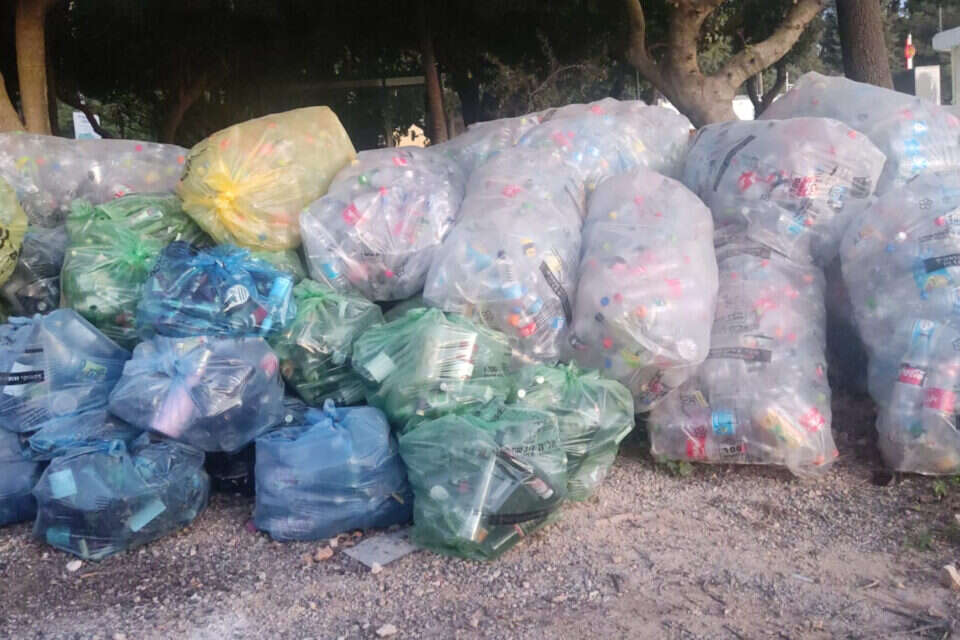Hundreds of thousands of plastic and glass bottles have become a hazard due to the impossibility of recycling. This is a phenomenon that repeats itself throughout the State of Israel, but even more so in communities that used to collect the bottles in order to donate the funds to various causes, and now find it difficult to do so.
In December 2021, the Ministry of Environmental Protection decided to change the collection system for recycling large plastic and glass beverage bottles. As part of the expansion of the Deposit Law, it was decided to remove recycling from the street, and to impose the obligation to return to supermarkets on consumers, in return for a refund of 30 agorot per bottle.
First in recycling beverage containers
However, intentions separately and reality separately: the awkwardness involved in transporting the bottles, the waiting time in supermarkets, limiting the number of bottles that can be recycled, and even quarrels over the way of refund – with a sum of money or a credit for a purchase at the business – have created a reality whereby residents avoid going to the supermarket, so that the system of separating and recycling the bottles does not run properly.
An example of this failure can be seen in an examination by the Association of Cities for the Environment of Judea, which found that in the union's area, which includes eight local authorities, there are close to 100,000 bottles collected for recycling by various communities - but without evacuation: the bottles pile up in yards, urban centers and even on the streets after the recycling bags burst from the heat.
Bags of bottles bursting in the street, photo: Shai Rabinovich
.
"The residents, youth and adult volunteers, collected bottles in a concentrated manner in order to transfer them for recycling and receive funds in return for the establishment of projects for the benefit of the community, such as an aid fund for disadvantaged families, the establishment of a loan center for medical equipment and more," says Dr. Naama Avrahamov, director of the union's waste department. However, it is not possible to transport such a quantity of bottles to supermarkets, according to the law it is not possible to return more than 50 bottles a day, and even then it is necessary to wait in line and count the quantity.
Regulate the vacuum in the market
In some localities, they tried to promote a direct contract with the corporation, which is owned by soft drink manufacturers and importers, but this does not provide an optimal solution. The process takes a very long time, and even when collection is finally scheduled, the truck does not arrive or take only a few of the tens of thousands of bottles collected. "The severe clumsiness makes the collection project a serious environmental nuisance and separation an impossible task," says Abrahamov.
Bags of bottles waiting to be collected, photo: Eli Shafir
.
The Director General of the Association of Cities for the Environment of Judea, Dr. Nitzan Levy, calls for legislative changes to solve the problem – increasing the recycling targets of beverage manufacturers and importers within the goals of the Deposit Law, so that they will be forced to collect and recycle a larger number of bottles, and to include plastic bottles in the Packaging Law (orange bins). This, he says, will enable the corporation, which has proven itself in the field of packaging recycling, to handle bottles as well. "Many residents are already throwing plastic bottles into orange bins," Levy says.
The Ministry of Environmental Protection said: "The Ministry of Environmental Protection is aware of the difficulty that exists today for associations and bodies that carry out welcome community collection, and has contacted bottle manufacturers and importers to continue collecting beverage containers with deposits from community entities. At the same time, the Ministry is working on an amendment to the Deposit Law so that it will be part of the legal obligations of beverage manufacturers and importers – and not voluntary.
"Until the issue is resolved and legislation is ordered, collection companies such as Asofta and BackBook, which operate on behalf of the beverage companies, can be contacted to coordinate their returns. Until the legislation is arranged, we are available for any request in order to provide specific assistance, but it is clear that such assistance is not the solution, and therefore the Ministry is working to regulate the market and amend the legislation, which will regulate the vacuum."
Wrong? We'll fix it! If you find a mistake in the article, please share with us

